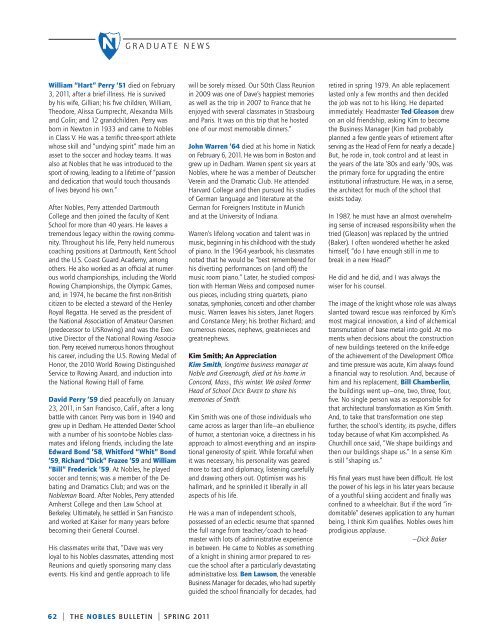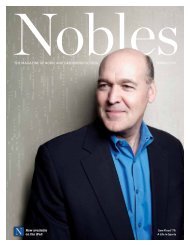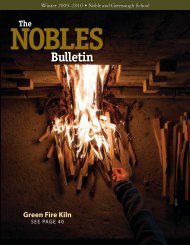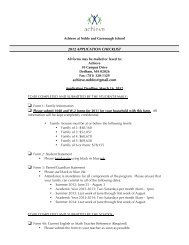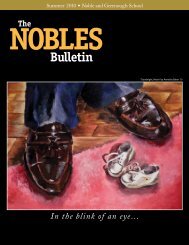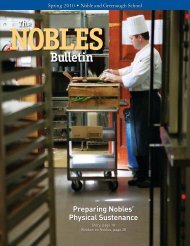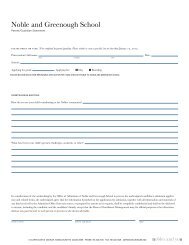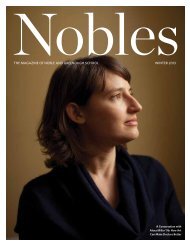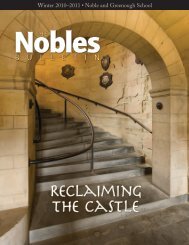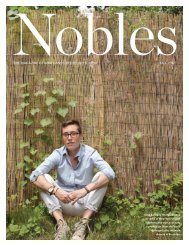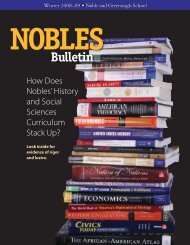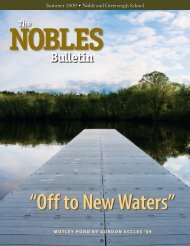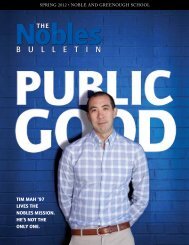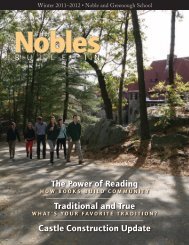To download a PDF of the 2011 Spring Bulletin, click here.
To download a PDF of the 2011 Spring Bulletin, click here.
To download a PDF of the 2011 Spring Bulletin, click here.
You also want an ePaper? Increase the reach of your titles
YUMPU automatically turns print PDFs into web optimized ePapers that Google loves.
G r A D u A T e N e W SWilliam “Hart” Perry ’51 died on February3, <strong>2011</strong>, after a brief illness. He is survivedby his wife, Gillian; his five children, William,Theodore, Alissa Gumprecht, Alexandra Millsand Colin; and 12 grandchildren. Perry wasborn in Newton in 1933 and came to Noblesin Class V. He was a terrific three-sport athletewhose skill and “undying spirit” made him anasset to <strong>the</strong> soccer and hockey teams. It wasalso at Nobles that he was introduced to <strong>the</strong>sport <strong>of</strong> rowing, leading to a lifetime <strong>of</strong> “passionand dedication that would touch thousands<strong>of</strong> lives beyond his own.”After Nobles, Perry attended DartmouthCollege and <strong>the</strong>n joined <strong>the</strong> faculty <strong>of</strong> KentSchool for more than 40 years. He leaves atremendous legacy within <strong>the</strong> rowing community.Throughout his life, Perry held numerouscoaching positions at Dartmouth, Kent Schooland <strong>the</strong> U.S. Coast Guard Academy, amongo<strong>the</strong>rs. He also worked as an <strong>of</strong>ficial at numerousworld championships, including <strong>the</strong> WorldRowing Championships, <strong>the</strong> Olympic Games,and, in 1974, he became <strong>the</strong> first non-Britishcitizen to be elected a steward <strong>of</strong> <strong>the</strong> HenleyRoyal Regatta. He served as <strong>the</strong> president <strong>of</strong><strong>the</strong> National Association <strong>of</strong> Amateur Oarsmen(predecessor to USRowing) and was <strong>the</strong> ExecutiveDirector <strong>of</strong> <strong>the</strong> National Rowing Association.Perry received numerous honors throughouthis career, including <strong>the</strong> U.S. Rowing Medal <strong>of</strong>Honor, <strong>the</strong> 2010 World Rowing DistinguishedService to Rowing Award, and induction into<strong>the</strong> National Rowing Hall <strong>of</strong> Fame.David Perry ’59 died peacefully on January23, <strong>2011</strong>, in San Francisco, Calif., after a longbattle with cancer. Perry was born in 1940 andgrew up in Dedham. He attended Dexter Schoolwith a number <strong>of</strong> his soon-to-be Nobles classmatesand lifelong friends, including <strong>the</strong> lateEdward Bond ’58, Whitford “Whit” Bond’59, Richard “Dick” Frazee ’59 and William“Bill” Frederick ’59. At Nobles, he playedsoccer and tennis; was a member <strong>of</strong> <strong>the</strong> Debatingand Dramatics Club; and was on <strong>the</strong>Nobleman Board. After Nobles, Perry attendedAmherst College and <strong>the</strong>n Law School atBerkeley. Ultimately, he settled in San Franciscoand worked at Kaiser for many years beforebecoming <strong>the</strong>ir General Counsel.His classmates write that, “Dave was veryloyal to his Nobles classmates, attending mostReunions and quietly sponsoring many classevents. His kind and gentle approach to lifewill be sorely missed. Our 50th Class Reunionin 2009 was one <strong>of</strong> Dave’s happiest memoriesas well as <strong>the</strong> trip in 2007 to France that heenjoyed with several classmates in Strasbourgand Paris. It was on this trip that he hostedone <strong>of</strong> our most memorable dinners.”John Warren ’64 died at his home in Natickon February 6, <strong>2011</strong>. He was born in Boston andgrew up in Dedham. Warren spent six years atNobles, w<strong>here</strong> he was a member <strong>of</strong> DeutscherVerein and <strong>the</strong> Dramatic Club. He attendedHarvard College and <strong>the</strong>n pursued his studies<strong>of</strong> German language and literature at <strong>the</strong>German for Foreigners Institute in Munichand at <strong>the</strong> University <strong>of</strong> Indiana.Warren’s lifelong vocation and talent was inmusic, beginning in his childhood with <strong>the</strong> study<strong>of</strong> piano. In <strong>the</strong> 1964 yearbook, his classmatesnoted that he would be “best remembered forhis diverting performances on (and <strong>of</strong>f) <strong>the</strong>music room piano.” Later, he studied compositionwith Herman Weiss and composed numerouspieces, including string quartets, pianosonatas, symphonies, concerti and o<strong>the</strong>r chambermusic. Warren leaves his sisters, Janet Rogersand Constance Mery; his bro<strong>the</strong>r Richard; andnumerous nieces, nephews, great-nieces andgreat-nephews.Kim Smith; An AppreciationKim Smith, longtime business manager atNoble and Greenough, died at his home inConcord, Mass., this winter. We asked formerHead <strong>of</strong> School Dick Baker to share hismemories <strong>of</strong> Smith.Kim Smith was one <strong>of</strong> those individuals whocame across as larger than life—an ebullience<strong>of</strong> humor, a stentorian voice, a directness in hisapproach to almost everything and an inspirationalgenerosity <strong>of</strong> spirit. While forceful whenit was necessary, his personality was gearedmore to tact and diplomacy, listening carefullyand drawing o<strong>the</strong>rs out. Optimism was hishallmark, and he sprinkled it liberally in allaspects <strong>of</strong> his life.He was a man <strong>of</strong> independent schools,possessed <strong>of</strong> an eclectic resume that spanned<strong>the</strong> full range from teacher/coach to headmasterwith lots <strong>of</strong> administrative experiencein between. He came to Nobles as something<strong>of</strong> a knight in shining armor prepared to rescue<strong>the</strong> school after a particularly devastatingadministrative loss. Ben Lawson, <strong>the</strong> venerableBusiness Manager for decades, who had superblyguided <strong>the</strong> school financially for decades, hadretired in spring 1979. An able replacementlasted only a few months and <strong>the</strong>n decided<strong>the</strong> job was not to his liking. He departedimmediately. Headmaster Ted Gleason drewon an old friendship, asking Kim to become<strong>the</strong> Business Manager (Kim had probablyplanned a few gentle years <strong>of</strong> retirement afterserving as <strong>the</strong> Head <strong>of</strong> Fenn for nearly a decade.)But, he rode in, took control and at least in<strong>the</strong> years <strong>of</strong> <strong>the</strong> late ’80s and early ’90s, was<strong>the</strong> primary force for upgrading <strong>the</strong> entireinstitutional infrastructure. He was, in a sense,<strong>the</strong> architect for much <strong>of</strong> <strong>the</strong> school thatexists today.In 1987, he must have an almost overwhelmingsense <strong>of</strong> increased responsibility when <strong>the</strong>tried (Gleason) was replaced by <strong>the</strong> untried(Baker). I <strong>of</strong>ten wondered whe<strong>the</strong>r he askedhimself, “do I have enough still in me tobreak in a new Head?”He did and he did, and I was always <strong>the</strong>wiser for his counsel.The image <strong>of</strong> <strong>the</strong> knight whose role was alwaysslanted toward rescue was reinforced by Kim’smost magical innovation, a kind <strong>of</strong> alchemicaltransmutation <strong>of</strong> base metal into gold. At momentswhen decisions about <strong>the</strong> construction<strong>of</strong> new buildings teetered on <strong>the</strong> knife-edge<strong>of</strong> <strong>the</strong> achievement <strong>of</strong> <strong>the</strong> Development Officeand time pressure was acute, Kim always founda financial way to resolution. And, because <strong>of</strong>him and his replacement, Bill Chamberlin,<strong>the</strong> buildings went up—one, two, three, four,five. No single person was as responsible forthat architectural transformation as Kim Smith.And, to take that transformation one stepfur<strong>the</strong>r, <strong>the</strong> school’s identity, its psyche, differstoday because <strong>of</strong> what Kim accomplished. AsChurchill once said, “We shape buildings and<strong>the</strong>n our buildings shape us.” In a sense Kimis still “shaping us.”His final years must have been difficult. He lost<strong>the</strong> power <strong>of</strong> his legs in his later years because<strong>of</strong> a youthful skiing accident and finally wasconfined to a wheelchair. But if <strong>the</strong> word “indomitable”deserves application to any humanbeing, I think Kim qualifies. Nobles owes himprodigious applause.—Dick Baker62 l <strong>the</strong> NobLES <strong>Bulletin</strong> l <strong>Spring</strong> <strong>2011</strong>


